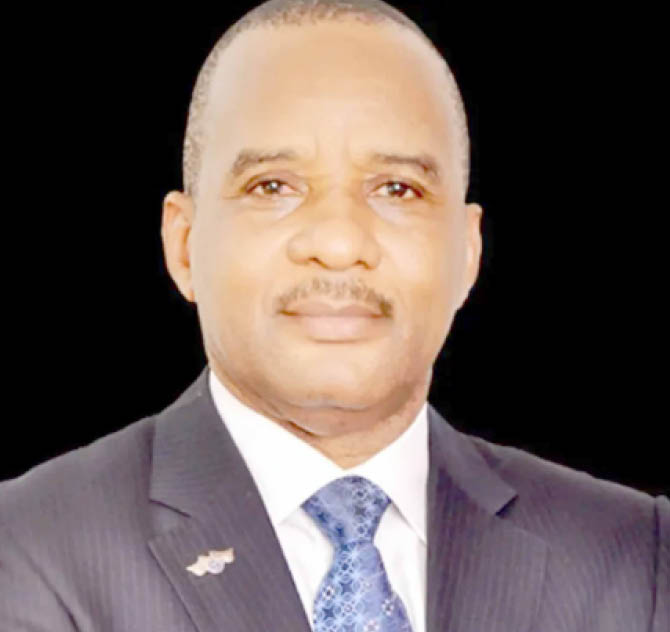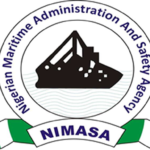The Director General of the Nigerian Maritime Administration and Safety Agency (NIMASA), Bashir Jamoh, speaks on how the maritime sector can become the cash cow of Nigeria, especially in the face of dwindling revenue from the oil sector.
Overview of sector
The overview of the nation’s maritime sector is a very promising one. Every management, when they come on board, they create the direction of what they intend to focus mainly on for the benefit of the industry so that they can consolidate on the successes of previous administrations.
When we came on board, we looked at the various areas of focus of different management, strategies, and agenda. Some previous management had a seven-point agenda. I think the last one had a five-point point agenda. So, we tried to compress our agenda to three broad-based areas. We called it Triple S: security, safety and shipping development.
Maritime safety
Maritime safety is one of the core mandates of the agency. This has to do with the safety of navigation and other safety measures at sea. Today, we are witnessing a number of achievements in this area. In 2021, the agency handled wreck removal for the first time. This is to ensure that navigable areas are safe for ships. In so doing, the Federal Executive Council (FEC) in the last quarter of 2021 approved the removal of shipwrecks right from Badagry up to Tin-Can Island. As of now, the contractors have achieved half of the performance. This means that half of the wrecks identified within that area have been removed.
Again, in the first quarter of 2022, FEC approved the removal of wrecks from the entire waters. This includes other zones in Nigeria. This comprises Western Zone, with headquarters in Lagos, Eastern Zone with headquarters in Port Harcourt and Central Zone with headquarters in Warri. All these contracts have reached remarkable progress. We are about to commence payment for the second tranche.
Similarly, on the issue of search and rescue, which also has to do with safety at sea, when the present management team came on board, most of our vessels used for search and rescue were grounded, and there was no vessel to embark on search and rescue. So, we did a critical assessment of the grounded vessels and what a new one will cost in the market to see if we can acquire new ones. We discovered that it was running into several billions of naira to acquire new ones.
So, to encourage local shipyards, we approached the Nigerian Navy Dockyard Limited. The navy engineers came to assess our search and rescue vessels, Millennium 1 and Millennium 2; they gave us an estimate of what it will cost to repair the two vessels. Right now we are hoping to get the two vessels repaired, thereby saving the country a huge amount of money in foreign currency. If you go to the Naval Dockyard, you will see them there. They are now like new ones. When we receive them, we will go back to our original mandate of search and rescue.
Maritime security
NIMASA adopts both kinetic and non-kinetic approaches to the issue of maritime security.
The Nigerian Navy (NN) handles the kinetic, while the non-kinetic is handled by NIMASA. The non-kinetic aspect has to do with devising means of containing insecurity in our waters without resorting to the use of firearms. In so doing, we ensure that there are laws in place that deal with criminality in and around our territorial waters.
Before 2018, we did not have any law that had to do with the trial of maritime-related offences and crimes. Many times, when we arrested and sent offenders to court, the judges did not have laws to handle maritime crimes. So, at the end those arrested and charged to court would be granted bail and between two and three days they would be back in our waters to commit more crimes.
So, we tried and got the SPOMO ACT which was signed into law by the president in June, 2019. Today, under the SPOMO ACT, we have tried 23 offenders, out of which seven have been handed seven-year jail terms, while another 10 have also been given jail terms.
We have also tried foreign nationals under the SPOMO ACT. They were fined because as at when the crimes were committed, they failed to volunteer information to security agencies as stipulated in the SPOMO ACT.
Also, we try to create an enabling environment in aggrieved riverine communities. We discovered that in these communities some youths went into crime because of lack of employment, poverty or outright corruption, while some idled away for lack of what to do. So, what we did was to use some of them to create intelligence units. Their responsibility is to provide us with useful information about an intended crime before it is committed. We also have Marine Environment Marshals who help to clean the marine environment.
In areas where there was little or no education, we introduced the Nigerian Seafarers Development Programme (NSDP). This is a programme developed for young persons who have had his/her secondary school education and read sciences. They are sent abroad so that they can compete with any seafarer from any part of the world. We send them to India, Greece, UK, Egypt, Romania and the Philippines. They are trained up to Certificate of Competence level.
A good number of them are presently working on board foreign vessels. But those who are not working outside the country are now with the NLNG. So far, under that programme, we have been able to train about 2,500 young Nigerians.
In the same vein, in order not to forget our indigenous training institutions, we try to ensure that our interface with the Maritime Academy of Nigeria (MAN) in Oron, Akwa Ibom State, is also improved.
We also have other private maritime institutions that are coming up in Nigeria. These local trainings have in no small measure saved the nation a lot in terms of foreign exchange. We also have the Martine University in Okerenkoko, Delta State. As you are aware, the agency is the one that built the Maritime University in Okerenkoko.
However, because that is not our core mandate, the National Universities Commission (NUC) directed that the university be handed over to the commission, but we still continue to fund the school so that they continue to produce top flight seafarers.
Shipping development
Sipping development is a tripod issue. The first leg is fleet expansion – this has to do with indigenous ownership of vessels. When considering fleet ownership in Nigeria, the question that should come to mind is whether it has increased or declined over a certain period. When the current administration at the Nigerian Maritime Administration and Safety Agency (NIMASA) came into office, it studied fleet ownership in Nigeria over the previous five years. It sought to know if fleet owners in the country increased over the period, or if there was actually a decrease.
The findings showed that there had been a steady decline in fleet ownership. This could be attributed to factors that include the country’s economic situation, and that is the reason why the federal government established the Cabotage Vessel Financing Fund (CVFF).
The second leg is ship repairs. To jump-start this activity, NIMASA bought a multi-million dollar modular floating dock over a year ago, but the initial challenge was where to locate it. As a way out of the challenge, the agency entered into an agreement with the Nigerian Ports Authority (NPA) for use of its continental shipping yard that was being used for its floating dock. The agreement involves NPA as the owner of the facility, a partner to manage the floating dock and NIMASA as the owner of the dock. Nigerians can expect that with the support of the Federal Ministry of Transportation, the nation as a whole and the shipping community in particular can expect to begin to reap the dividends of this significant maritime investment.
The third leg is shipbuilding. We have conducted a study of shipbuilders in Nigeria. In the course of the study, we have tried to find out the number of shipbuilders we have in Nigeria, their capacity, etc. There are several shipyards, and some are operating at very low capacity.
With the continuous decline in oil revenue, and against the backdrop of the government’s efforts at diversifying the economy, maritime is one sector that has the potential to become the country’s cash cow. Again, a fully developed and vibrant shipping industry can reduce quite substantially the queue in the country’s labour market because of the hundreds of thousands of jobs it will create. All that is required to kick start the drive to make the maritime sector realise its full potential is adequate funding of activities in the sector.

 Join Daily Trust WhatsApp Community For Quick Access To News and Happenings Around You.
Join Daily Trust WhatsApp Community For Quick Access To News and Happenings Around You.


